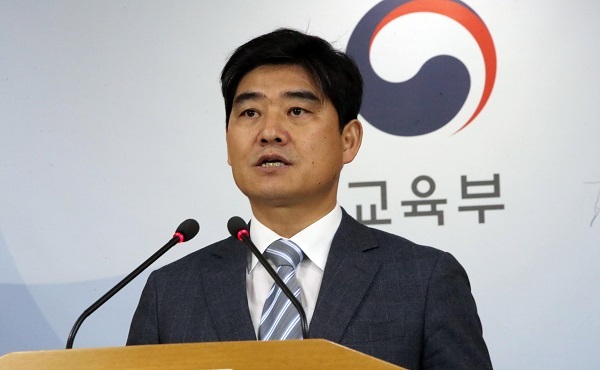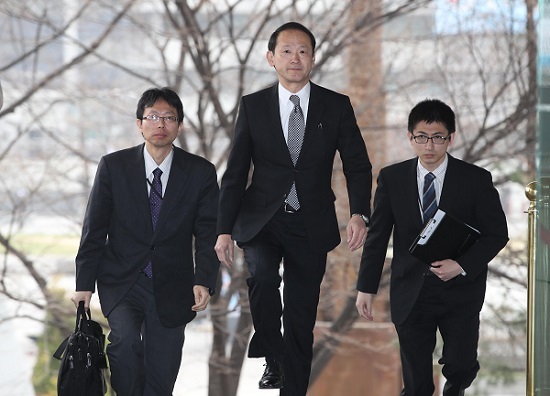Seoul on Friday condemned Tokyo’s reinforced claim to Korea’s easternmost islets of Dokdo through new educational guidelines, which further stoked the territorial and historical tensions between the two countries.
The Japanese government approved updated guidelines for primary and middle schools, in which the islets are described for the first time as Japanese territory.
 |
Education Ministry spokesperson Ju Miung-hyun condemns Tokyo’s reinforced claim to Korea’s easternmost islets of Dokdo through new educational guidelines, which further stoked the territorial and historical tensions between the two countries. (Yonhap) |
Seoul's foreign and education ministries issued stringent criticism, demanding the decision’s renouncement. Deputy Foreign Minister Lee Jeong-Kyu summoned Hideo Suzuki, a minister at the Japanese Embassy who is serving as the acting ambassador in place of Yasumasa Nagamine, to lodge a complaint.
“We strongly condemn the guideline’s approval despite our repeated warnings, and urge its immediate withdrawal,” the Foreign Ministry said in a statement.
“We warn the Japanese government must clearly realize that if it continues to instill incorrect historical perceptions about Dokdo, which was the first victim to Japan’s imperialism, its future generations will learn false history.”
Education Ministry spokesperson Ju Miung-hyun also said the “unjust sovereignty argument is no different from the past imperialist invasion,” calling for Tokyo’s reflection on its history of aggressive war that inflicted “despair and pain” on neighboring countries.
In the update, the guideline stipulates Dokdo as “indigenous Japanese territory,” along with the Senkaku/Diayou islands and the Northern Territories -- claimed respectively by China and Russia. It also calls for social life classes to deal with Tokyo’s “efforts to peacefully resolve” the issues.
 |
Hideo Suzuki, Japan’s acting ambassador to South Korea, enters the Ministry of Foreign Affairs building in Seoul on Friday, after being summoned by Seoul officials over Tokyo’s decision to approve revised education guidelines on Dokdo, a set of islets that are the subject of territorial disputes between the two countries. (Yonhap) |
Tokyo revises the manual every 10 years in general and last amended it in 2008. It will take effect in 2020 for elementary schools and 2021 for middle schools.
The approval reflects the Shinzo Abe government’s efforts to match its sovereignty claims in the top educational manual along the lines of its teachers’ handbook, modified in 2014, and existing schoolbooks.
Currently all 19 versions of middle school social studies textbooks and four elementary school textbooks carry the Dokdo claim, according to Seoul officials.
The present handbook also calls for schools to “clearly remind” students in geography courses the islets, there known as Takeshima, are “indigenous Japanese territory but illegally occupied by Korea.” History teachers are required to mention how Japan incorporated Dokdo based on “rational grounds under international law.”
This marks a sharply toughened statement over its previous version in 2008 that merely said “there is a difference” between Korea and Japan on their views on Dokdo.
At the height of the Russo-Japanese War in 1905, Tokyo illicitly annexed Dokdo to install communication and surveillance devices and collect intelligence on Russian naval movements. Japan returned the islets to Korea after winning the war, but then soon pushed to occupy the entire peninsula.
The Abe administration has been stepping up its sovereignty assertions via diplomatic and defense papers, teaching and schoolbook guidelines and other methods.
The latest development dealt another blow to bilateral relations already strained by the wartime sex slavery issues. Ambassador Nagamine was recalled home in January as Japan protested the installment of a new “comfort women” statue in front of its consulate-general in Busan.
Tokyo countered to the historical tension with territorial provocations, with even its Foreign Minister Fumio Kishida renewing the Dokdo claim after a provincial assembly here floated a plan to launch another memorial on the islets.
By Shin Hyon-hee (
heeshin@heraldcorp.com)









![[Today’s K-pop] Blackpink’s Jennie, Lisa invited to Coachella as solo acts](http://res.heraldm.com/phpwas/restmb_idxmake.php?idx=644&simg=/content/image/2024/11/21/20241121050099_0.jpg)